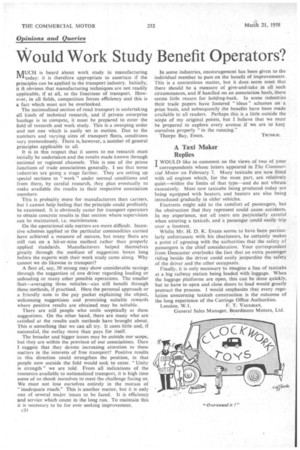Would Work Study Benefit Operators?
Page 60

If you've noticed an error in this article please click here to report it so we can fix it.
MUCH is heard about work study in manufacturing
"today: it is therefore appropriate to ascertain if the principles can be applied to the transport industry. Initially, it i§ obvious that manufacturing techniques are not readily applicable, if at all, to the functions of transport. However, in all fields, competition forces efficiency and this is a fact which must not be overlooked.
The nationalized section of road transport is undertaking all kinds of technical research, and if private enterprise haulage is to compete, it must be prepared to enter the field of research and work study. This is a sweeping order and not one which is easily set in motion. Due to the numbers and varying sizes of transport fleets, conditions vary tremendously. There is, however, a number of general principles applicable to all.
It is in this respect that it seems to me research must initially be undertaken and the results made known throtigh national or regional channels. This is one of the prime functions of trade associations generally. I see that some industries •are going a stage farther. They are setting up special sections to "work " under normal conditions and from there, by careful research, they plan eventually to make available the results to their respective association members.
This is probably more for manufacturers than carriers, but I cannot help feeling that the principle could profitably be examined. It is obviously easier for transport operators to obtain concrete results in that section where supervision can be maintained, i.e. maintenance.
On the operational side matters are more difficult. Incentive schemes applied to the particular commodities carried have achieved a measure of success, but many fleets are still run on . a hit-or-miss method rather than properly applied standards. Manufacturers helped themselves greatly through the medium of suggestion boxes long before the experts with their .work study came along. Why cannot we do likewise in transport?
A fleet of, say, 50 strong may show considerable savings through the suggestion of one driver regarding loading or unloading or many other possible operations. The smaller fleet—averaging three vehicles—can still benefit through these methods, if practised. Here the personal approach or a friendly note in the pay packet explaining the object, welcoming suggestions and promising suitable rewards where positive results are obtained may be suitable.
There are still people who smile sceptically at these suggestions. On the other hand, there are many who are satisfied at the results such methods have brought about. This is something that we can all try. It costs little and, if successful, the outlay more than pays for itself.
The broader and bigger issues may be outside our scope, but they are within the province of our associations. Dare I suggest that they devote increasing attention to these matters in the interests of free transport? Positive results in this direction could strengthen the position, in that people now outside the fold would seek to enter. "Unity is strength" we are told. From all indications of the resources available to nationalized transport, it is high time some of us shook ourselves to meet the challenge facing us. We must not lose ourselves entirely in the morass of "inadequate roads." This is another matter, but it is only one of several major issues to be faced. It is efficiency and service which count in the long run. To maintain this it is necessary to be for ever seeking improvement.
(14
In some industries, encouragement has been given to the individual member to pass on the benefit of improvements. This is a contentious matter, but it does seem meet that there should be a measure of give-and-take in all such circumstances, and if handled on an association basis, there seems little reason for holding-back. In some industries their trade papers have fostered "ideas " schemes on a prize basis, and subsequently the benefits have been made available to all readers. Perhaps this is a little outside the scope of my original points, but I believe that we must be prepared to explore every avenue if we are to keer ourselves properly "in the running."
Thorpe Bay, Essex. TRUNKIE.








































































































